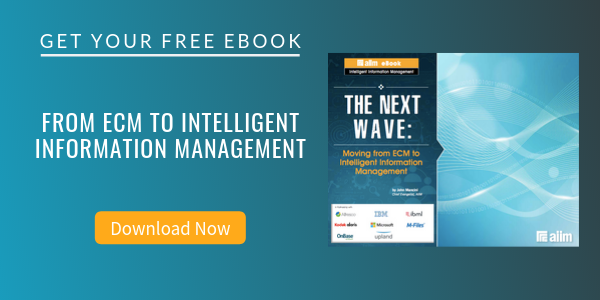
Looking at Information Management through a Different Lens
Intelligent Information Management (IIM)
Organizations need to think about how the advent of the third wave of exponential change – the drive to Artificial Intelligence and Machine Learning - will require them to look at the future through a different set of lenses. I’d like to offer three of these “lenses” – I’m sure there are more – but I think these three are ones that those in this community are uniquely prepared to tackle.
Lens #1: Big Content + New Tools
We are gathering information at an unprecedented scale – this isn’t new. What is new is that for the first time, we have tools to actually make sense of it.
For the most part, we haven’t thought through the ethics of what all of this unprecedented accumulation of information – and the tools to analyze it -- actually means. Until we do, we will continue to careen from one privacy crisis to another, and from one ham-handed political response to another.
GDPR is not just a temporary annoyance, and Blockchain is not just a fad. Both reflect a fundamental tension. We need new ways of thinking about the question of information stewardship. Stewardship has two components – a set of best practices – what you do -- and the character of the steward – who you are. We are learning that being cavalier -- about who manages our data, what they do with it, whether the steward is, in reality, a potential competitor, and whether that steward also monetizes OUR data – has consequences.
Lens #2: Content AND Data, Not Content OR Data
Those of us who have lived and made careers and built companies on the unstructured side of the information management continuum – on the content management side – is about to enter a much bigger world. This is a world in which the kinds of information assets we care about are about to become much more important.
A lot of folks on the data analytics and data governance and robotic process sides of our organizations have no idea what we do on the content/unstructured side, why it requires different disciplines, and how we do it. I’ve spoken to data people who think it’s kind of magic to be able to scrape data from a form that you've never seen before and automatically incorporate this data into a business process. Which is something we've been doing for a decade.
In the old world, Content Management was the lens through which we viewed much of the “process” world. In the world that is coming, content management, content services, content abracadabra, whatever you want to call it, will be part of something bigger. We’re calling it Intelligent Information Management, but that’s an intentionally broad term to describe a strategy and a set of practices, not a technology segment.
Lens #3: The Curse of Knowledge
I’ve often been fascinated with the “Curse of Knowledge” – the tendency of people with very detailed and specific knowledge to unknowingly assume that the subject of their communications has the background to actually understand what they are talking about.
As we move into the age of artificial intelligence and machine learning, the quantity of knowledge at our fingertips is mind-boggling. But the age-old problem of sifting through what business people know and what technology people know and making these match is getting worse, not better. When I think about the technology errors I made over the years at AIIM, they all centered around the IT folks not really understanding what the business was all about, and me feeling afraid to look dumb when the IT folks played their buzzcard bingo technology trump cards.
As I think about how this all plays out in the Age of Machine Learning, I think back to a report on Big Data that AIIM did 5 – yes 5 -- years ago. And I give a lot of kudos to my colleagues Doug Miles, and David Jones (now with Nuxeo) – for how far-sighted they were.
They noted in that report, yes, we need data scientists – and lots more of them. But we also need data entrepreneurs. Both perspectives are needed. And each suffers from their own knowledge curse – one that is likely to get worse rather than better over time unless organizations address it directly.
“The data scientist has his ear to the business, and his eyes full on the data – the data entrepreneur has exactly the opposite focus, eyes full on the business, ear to the data.“
Opportunities Abound
Our conversations about "incumbents" and "disruption" are usually in the context of something that is done BY some outsider or new player TO clueless incumbent players. Discussions of this sort (including my own) usually include a list of predictable disruptor/clueless pairings – for example, Blockbuster/Netflix or Yellow Cabs/Uber or Craigslist/classified advertisers.
In a recent speech, IBM’s Ginni Rometty noted that if we truly are in the era of data, and only about 20% of the data in the world is currently managed and searchable, then the owners of the residual 80% -- largely incumbent businesses – are sitting on an enormous opportunity.
This is incredibly important because many companies just don’t sense the opportunity -- many are either scared or oblivious. This is equally true at the individual level when I think about information professionals in the AIIM space who are wondering how/whether all of their records management and content management skills will continue to be relevant in the years ahead.
There is a huge opportunity – an incumbent opportunity, both organizationally and professionally -- in the disruptive times ahead.
If, if, if we can get out of our own way. And that requires leadership and commitment.
And Change.
About John Mancini
John Mancini is the President of Content Results, LLC and the Past President of AIIM. He is a well-known author, speaker, and advisor on information management, digital transformation and intelligent automation. John is a frequent keynote speaker and author of more than 30 eBooks on a variety of topics. He can be found on Twitter, LinkedIn and Facebook as jmancini77. Recent keynote topics include: The Stairway to Digital Transformation Navigating Disruptive Waters — 4 Things You Need to Know to Build Your Digital Transformation Strategy Getting Ahead of the Digital Transformation Curve Viewing Information Management Through a New Lens Digital Disruption: 6 Strategies to Avoid Being “Blockbustered” Specialties: Keynote speaker and writer on AI, RPA, intelligent Information Management, Intelligent Automation and Digital Transformation. Consensus-building with Boards to create strategic focus, action, and accountability. Extensive public speaking and public relations work Conversant and experienced in major technology issues and trends. Expert on inbound and content marketing, particularly in an association environment and on the Hubspot platform. John is a Phi Beta Kappa graduate of the College of William and Mary, and holds an M.A. in Public Policy from the Woodrow Wilson School at Princeton University.



